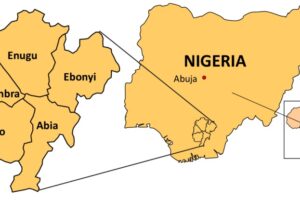The Meiji Revolution and Making a Nation Great: Lessons from Japanese Phenomenal Transformation

Christian C. Madubuko, PhD.
As the world looks to the annals of history for inspiration and guidance, one story stands out as a beacon of hope and transformation: Japan’s remarkable journey from a war-torn nation to a global powerhouse. The Meiji Revolution, which began in 1868, was a turning point in Japan’s history, marked by a bold decision to abandon the traditional feudal system and adopt Western values, technologies, and institutions. This transformation was not without its challenges, but it laid the foundation for Japan’s subsequent rise to global prominence.
For Nigeria, which has long grappled with its own challenges of corruption, mismanagement, and underdevelopment, the lessons of Japan’s transformation are particularly pertinent. Like Japan, Nigeria is a nation with immense potential, blessed with natural resources, a vibrant culture, and a rich history. Yet, it has struggled to realize its full potential, mired in a cycle of stagnation and decline.
One of the most important lessons that Nigerian leaders can learn from Japan’s experience is the importance of vision and leadership. During the Meiji Revolution, Japan’s leaders had a clear and compelling vision for their nation’s future, and they worked tirelessly to achieve it. They recognized that their country’s survival depended on its ability to adapt to changing circumstances and to compete with other nations on the world stage.
Similarly, Nigerian leaders must have a clear vision for their nation’s future and be willing to make the tough decisions necessary to achieve it. This requires more than just rhetoric; it demands a deep understanding of the challenges facing the country and a commitment to tackling them head-on.
Another key lesson from Japan’s transformation is the importance of investment in human capital. During the Meiji period, Japan recognized that its people were its greatest asset, and it invested heavily in education and training programs to develop their skills and knowledge. Today, Nigeria faces a similar challenge: its young population is both its greatest strength and its biggest challenge.
To unlock this potential, Nigerian leaders must prioritize education and invest in programs that will equip young Nigerians with the skills they need to succeed in an increasingly globalized world. This requires more than just throwing money at the problem; it demands a systemic approach that addresses the root causes of poverty and inequality.
A third lesson from Japan’s experience is the importance of institutional reform. During the Meiji period, Japan’s leaders recognized that their country’s institutions were outdated and ineffective, and they set about creating new ones that were better equipped to serve the needs of a modern nation.
Similarly, Nigerian leaders must recognize that their country’s institutions are often weak and ineffective, and they must work to strengthen them. This requires more than just cosmetic changes; it demands a fundamental overhaul of the way government works.
Summary of Lessons from the Japanese Transformations for Nigerian Leaders and Policymakers
Embracing Change is Key: Japan’s transformation was marked by a willingness to abandon traditional practices and adopt new ideas. Nigerian leaders must be open to change and willing to challenge the status quo.
Lesson: Be willing to disrupt the norm and take calculated risks to drive progress.
Visionary Leadership Matters: Japan’s leaders had a clear vision for their country’s future, and they worked tirelessly to achieve it. Nigerian leaders must have a similar vision for their country’s future and be willing to lead by example.
Lesson: Develop a clear and compelling vision for Nigeria’s future and lead by example.
Invest in Human Capital: Japan invested heavily in education and training during its transformation, recognizing that its people were its greatest asset. Nigerian leaders must prioritize education and invest in programs that will equip young Nigerians with the skills they need to succeed.
Lesson: Prioritize education and invest in programs that will equip young Nigerians with the skills they need to succeed.
Foster a Culture of Innovation: Japan has a culture of innovation that drives its economy forward. Nigerian leaders must foster a similar culture of innovation, encouraging entrepreneurship, creativity, and risk-taking.
Lesson: Encourage innovation and entrepreneurship by providing resources and support for startups and small businesses.
Build Strong Institutions: Japan’s institutions were overhauled during its transformation, creating a strong foundation for growth and development. Nigerian leaders must prioritize institution-building, creating strong, accountable institutions that serve the needs of all citizens.
Lesson: Prioritize institution-building, creating strong, accountable institutions that serve the needs of all citizens.
Promote Transparency and Accountability: Japan’s transformation was marked by increased transparency and accountability, which helped to build trust in government and promote economic growth. Nigerian leaders must prioritize transparency and accountability, ensuring that government is accountable to the people.
Lesson: Prioritize transparency and accountability, ensuring that government is accountable to the people.
Foster National Unity: Japan’s transformation was marked by national unity, with citizens coming together to drive progress. Nigerian leaders must foster national unity, promoting a sense of shared purpose and responsibility among all citizens.
Lesson: Foster national unity by promoting a sense of shared purpose and responsibility among all citizens.
Invest in Infrastructure: Japan invested heavily in infrastructure during its transformation, recognizing that it was essential for growth and development. Nigerian leaders must prioritize infrastructure development, investing in roads, ports, airports, and other critical infrastructure.
Lesson: Prioritize infrastructure development, investing in roads, ports, airports, and other critical infrastructure.
Encourage Foreign Direct Investment: Japan welcomed foreign investment during its transformation, recognizing its importance for economic growth. Nigerian leaders must encourage foreign direct investment, creating an attractive business environment that encourages investment from around the world.
Lesson: Encourage foreign direct investment by creating an attractive business environment that encourages investment from around the world.
Lead by Example: Japan’s leaders led by example during its transformation, setting high standards for themselves and others. Nigerian leaders must lead by example, setting high standards for themselves and others and demonstrating a commitment to integrity, transparency, and accountability.
Lesson: Lead by example, setting high standards for yourself and others and demonstrating a commitment to integrity, transparency, and accountability.
By learning from Japan’s transformation, Nigerian leaders can unlock their country’s potential and drive progress towards a brighter future.
Finally, Japan’s transformation was not without its challenges. The country faced significant resistance from traditional elites who were threatened by change, and it required great courage and perseverance from its leaders to push through difficult reforms.
Nigerian leaders must also be prepared to face challenges and push through difficult reforms if they are serious about transforming their country. This will require them to build coalitions with other stakeholders, including civil society groups and the private sector, and to communicate effectively with their citizens about the need for change.
In conclusion, Nigeria has much to learn from Japan’s remarkable transformation. By embracing a clear vision for their nation’s future, investing in human capital, strengthening institutions, and pushing through difficult reforms, Nigerian leaders can help their country unlock its full potential and become a major player on the global stage. It is time for Nigeria to embark on its own “Meiji Revolution,” one that will transform its fortunes for generations to come.
Dr. Christian C. Madubuko – a Political & Diplomatic Historian, is a Senior Lecturer at the Department of History & International Studies, Nnamdi Azikiwe University, Awka, Nigeria, & a researcher at LaTrobe University, Melbourne, Australia. Madubuko was a former Anambra Commissioner for Trade and Commerce as well as the Executive Director of Operations, Anambra Internal Revenue Service. He writes from Canberra – The Australian Capital Territory, ACT. Mobile/WhatsApp: +2348162527884
E-mail: ogbekingdom@gmail.com




